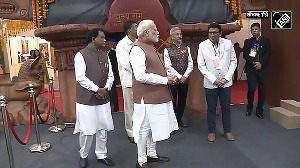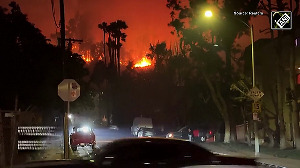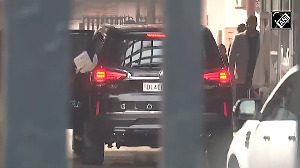A measure to double the number of H-1B skilled-worker temporary visas to 115,000 -- with an option of raising the cap 20 per cent more each year -- has been introduced in the Senate's giant Immigration Bill, now pending before US Congress.
If passed, the Bill would open US' doors to highly skilled immigrants for science, math, technology and engineering jobs from India, China and other nations.
The H1-B visa provisions were sought by Silicon Valley technology companies and enjoy significant bipartisan support amid concern that the United States might lose its lead in technology, according to a report in the San Francisco Chronicle.
The provision for highly skilled workers enjoys support in both parties in the Senate and in President George W Bush's administration after a raft of high-profile studies have warned that the United States is not producing enough math and science students and is in danger of losing its global edge in innovation to India and China.
The new skilled immigration measures are part of a controversial 300-page bill by Senate Judiciary Committee Chairman Arlen Specter, now being rewritten by the committee with the goal of reaching the Senate floor by the end of the month.
Other provisions in the bill include a new F-4 visa category for students pursuing advanced degrees in science, technology, engineering or mathematics. These students would be granted permanent residence if they find a job in their field and pay a $1,000 fee toward scholarships and training of US workers.
Other proposals in the bill include streamlining labour certification rules for foreigners holding the desired advanced degrees from a US university.
Immigrants with advanced degrees in the desired fields, as well as those of 'extraordinary ability' and 'outstanding professors and researchers,' would also get an exemption from the cap on employment-based green cards and slots for permanent residence.
H-1B visas were highly controversial in California's Bay Area when their numbers peaked to 195,000 in 2003, when Congress had increased the visas during the late 1990s dot-com boom and Silicon Valley complained of tech-worker shortages.
However Congress quietly allowed the number of H-1B visas to plummet back to 65,000 a year when the dot-com bubble burst and the revelation that some of the September 11, 2001 hijackers had entered the country on student visas.
The cap was reached quickly in August -- in effect turning off the tap of the visas for 14 months. A special exemption of 20,000 visas for workers with advanced degrees was reached in January.
And the Essential Worker Immigration Coalition, a business umbrella group backing more immigration put out a statement to say: "We are totally jammed on immigrant visas, the green card category, and totally jammed on H-1B visas. You can't bring in technology workers right now."





 © 2025 Rediff.com -
© 2025 Rediff.com -